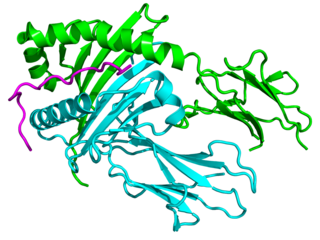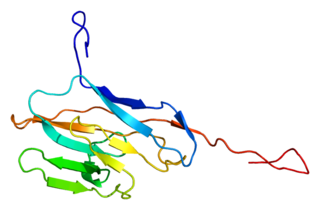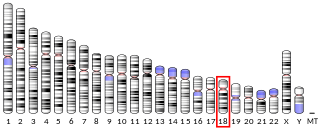Carcinoembryonic antigen-related cell adhesion molecule 6 (non-specific cross reacting antigen) (CEACAM6) also known as CD66c (Cluster of Differentiation 66c), is a member of the carcinoembryonic antigen (CEA) gene family.. [3]
Carcinoembryonic antigen-related cell adhesion molecule 6 (non-specific cross reacting antigen) (CEACAM6) also known as CD66c (Cluster of Differentiation 66c), is a member of the carcinoembryonic antigen (CEA) gene family.. [3]

Carcinoembryonic antigen (CEA) describes a set of highly related glycoproteins involved in cell adhesion. CEA is normally produced in gastrointestinal tissue during fetal development, but the production stops before birth. Consequently, CEA is usually present at very low levels in the blood of healthy adults. However, the serum levels are raised in some types of cancer, which means that it can be used as a tumor marker in clinical tests. Serum levels can also be elevated in heavy smokers.

Selectin P ligand, also known as SELPLG or CD162, is a human gene.

Platelet endothelial cell adhesion molecule (PECAM-1) also known as cluster of differentiation 31 (CD31) is a protein that in humans is encoded by the PECAM1 gene found on chromosome17q23.3. PECAM-1 plays a key role in removing aged neutrophils from the body.

CD11c, also known as Integrin, alpha X (ITGAX), is a gene that encodes for CD11c.

C-type lectin domain family 4 member M is a protein that in humans is encoded by the CLEC4M gene. CLEC4M has also been designated as CD299.

Major histocompatibility complex, class II, DQ alpha 1, also known as HLA-DQA1, is a human gene present on short arm of chromosome 6 (6p21.3) and also denotes the genetic locus which contains this gene. The protein encoded by this gene is one of two proteins that are required to form the DQ heterodimer, a cell surface receptor essential to the function of the immune system.

Carcinoembryonic antigen-related cell adhesion molecule 1 (CEACAM1) also known as CD66a, is a human glycoprotein, and a member of the carcinoembryonic antigen (CEA) gene family.

Pregnancy specific beta-1-glycoprotein 1 (PSBG-1) also known as CD66f, is a protein that in humans is encoded by the PSG1 gene and is a member of the carcinoembryonic antigen (CEA) gene family. Pregnancy-specific glycoproteins (PSGs) are a complex consisting of carbohydrate and protein, which is present in the mammalian body specifically during pregnancy. This glycoprotein is the most abundant protein found in the maternal bloodstream during the later stages of pregnancy and it is of vital importance in fetal development. The PSG functions primarily as an immunomodulator to protect the growing fetus.

Pregnancy-specific beta-1-glycoprotein 9 is a protein that in humans is encoded by the PSG9 gene.

Carcinoembryonic antigen-related cell adhesion molecule 3 (CEACAM3) also known as CD66d, is a member of the carcinoembryonic antigen (CEA) gene family..

Carcinoembryonic antigen-related cell adhesion molecule 8 (CEACAM8) also known as CD66b, is a member of the carcinoembryonic antigen (CEA) gene family. Its main function is cell adhesion, cell migration, and pathogen binding.

Pregnancy-specific beta-1-glycoprotein 5 is a protein that in humans is encoded by the PSG5 gene.

Carcinoembryonic antigen-related cell adhesion molecule 7 is a protein that in humans is encoded by the CEACAM7 gene.

Pregnancy-specific beta-1-glycoprotein 4 is a protein that in humans is encoded by the PSG4 gene.

Cell adhesion molecule 3 is a protein that in humans is encoded by the CADM3 gene.

Galectin-4 is a protein that in humans is encoded by the LGALS4 gene.
Pregnancy-specific beta-1-glycoprotein 10 is a protein that in humans is encoded by the PSG10 gene.

Carcinoembryonic antigen-related cell adhesion molecule 5 (CEACAM5) also known as CD66e, is a member of the carcinoembryonic antigen (CEA) gene family.

Collectin-12, also known as collectin subfamily member 12, is a collectin protein that in humans is encoded by the COLEC12 gene.
This article incorporates text from the United States National Library of Medicine, which is in the public domain.